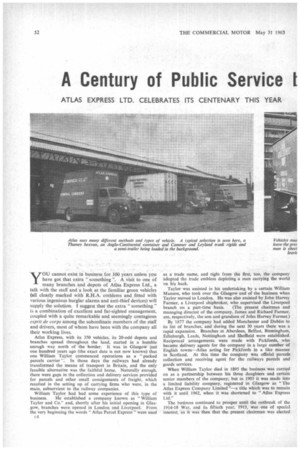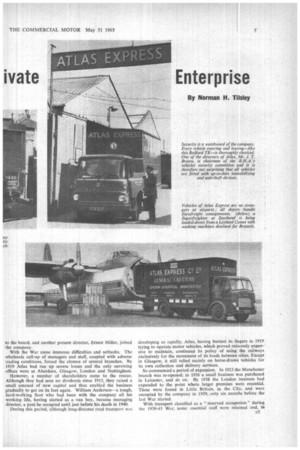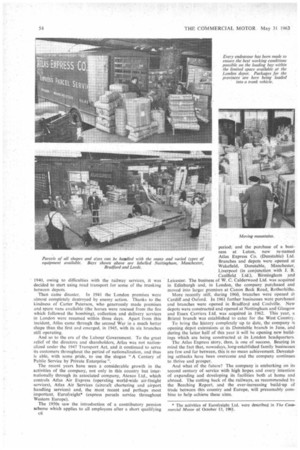A Century of Public Service I: ivate
Page 54

Page 55

Page 56

If you've noticed an error in this article please click here to report it so we can fix it.
ATLAS EXPRESS LTD. CELEBRATES ITS CENTENARY THIS YEAR
yOU cannot exist. in business for. 100 years unless you have got that extra "something ". A visit to one of many branches and depots of Atlas Express Ltd., a talk with the staff and a look at the familiar green vehicles (all clearly marked with R.H.A. emblems and fitted with various ingenious burglar alarms and anti-thief devices) will supply the solution. I suggest that the extra " something " is a combination of excellent and far-sighted management, coupled with a quite remarkable and seemingly contagious esprit de corps among the subordinate members of the staff and drivers, most of whom have been with the company all their working lives.
Atlas Express, with its 350 vehicles, its 20-odd depots and branches spread throughout the land, started in a humble enough way north of the border. It was in Glasgow just one hundred years ago (the exact date is not now known) that one William Taylor commenced operations as a "packed parcels carrier ". in those days the railways had already transformed the means of transport in Britain, and the only feasible alternative was the faithful horse. Naturally enough, there were gaps in the collection and delivery services provided for parcels and other small consignments of freight, which resulted in the setting up of carrying firms who were, in the main, subservient to the railway companies.
William Taylor had had some experience of this type of business. He established a company known. as "William Taylor and Co." and, shortly after his initial opening in Glasgow, branches were opened in London and Liverpool. From the very beginning the words "Atlas Parcel Express" were used c4
as a trade name, and right from the first, too, the company adopted the trade emblem depicting a man carrying the world on his back_
Taylor was assisted in his undertaking by a certain William Manson, who took over the Glasgow end of the business when Taylor moved to London. He was also assisted by John Harvey Farmer, a Liverpool shipbroker, who supervised the Liverpool branch on a part-time basis. (The present chairman and managing director of the company, James and Richard Farmer, are, respectively, the son and grandson of John Harvey Farmer.)
By 1877 the company had added Manchester and Dublin to its list of branches, and during the next 30 years there was a rapid expansion. Branches at Aberdeen, Belfast, Birmingham, Edinburgh, Leeds, Nottingham and Sheffield were established. Reciprocal arrangements were made with Pickfords, who became delivery agents for the company in a large number of English towns—Atlas acting for Pickfords in a like manner in Scotland. At this time the company was official parcels collection and receiving agent for the railways parcels and goods services.
When William Taylor died in 1895 the business was carried on as a partnership between his three daughters and certain senior members of the company; but in 1903 it was made into a limited liability company, registered in Glasgow as "The Atlas Express Company Limited "—a title which was to remain with it until 1962, when it was shortened to "Atlas Express Ltd."
The business continued to prosper until the outbreak of the 1914-18 War, and its fiftieth year, 1913, was one of special interest, as it was then that the present chairman was elected
to the board, and another present director, Ernest Miller, joined the company.
With the War came immense difficulties and setbacks. The wholesale call-up of managers and staff, coupled with adverse trading conditions, forced the closure of several branches. By 1919 Atlas had run up severe losses and the only surviving offices were at Aberdeen, Glasgow, London and Nottingham.
However, a number of shareholders came to the rescue. Although they had seen no dividends since 1913, they raised a small amount of new capital and thus enabled the business gradually to get on its feet again. William Anderson—a tough, hard-working Scot who had been with the company all his working life, having started as a van boy, became managing director, a post he occupied until just before his death in 1940.
During this period, although long-distance road transport was developing so rapidly, Atlas, having burned its fingers in 1919 trying to operate motor vehicles, which proved ruinously expensive to maintain, continued its policy of using the railways exclusively for the movement of its loads between cities. Except in Glasgow, it still relied mainly on horse-drawn vehicles for its own collection and delivery services.
So commenced a period of expansion. In 1923 the Manchester branch was re-opened; in 1926 a small business was purchased in Leicester, and so on. By 1938 the London business had expanded to the point where larger premises were essential. These were found in Little Britain, in the City, and were occupied by the company in 1939, only six months before the last War started.
With transport classified as a "reserved occupation" during the 1939-45 War, some essential staff were retained and, in c5 1940, owing to difficulties with the railway services, it was decided to start using road transport for some of the trunking between depots.
Then came disaster. In 1941 the London premises were almost completely destroyed by enemy action. Thanks to the kindness of Carter Paterson, who generously made premises and spare vans available (the horses were rescued from the fire which followed the bombing), collection and delivery services in London were resumed within three days. Apart from this incident, Atlas came through the second War in a much better shape than the first and emerged, in 1945, with its six branches still operating.
And so to the era of the Labour Government. To the great relief of the directors and shareholders, Atlas was not nationalized under the 1447 Transport Act, and it continued to serve its customers throughout the period of nationalization, and thus is able, with some pride, to use the slogan "A Century of Public Service by Private Enterprise".
The recent years have seen a considerable growth in the activities of the company, not only in this country but internationally through its associated company, Atexco Ltd., which controls Atlas Air Express (operating world-wide air-freight services), Atlas Air Services (aircraft chartering and airport handling services) and, the most recent and perhaps most important, Eurofreight* (express parcels service throughout Western Europe).
The 1950s saw the introduction of a contributory pension scheme which applies to all employees after a short qualifying c6
period; and the purchase of a business at Luton, now re-named Atlas Express Co. (Dunstable) Ltd. Branches and depots were opened at Wakefield, Dunstable, Manchester, Liverpool (in conjunction with J. B. Caulfield Ltd.), Birmingham and Leicester. The business of W. C. Calderwood Ltd. was acquired in Edinburgh and, in London, the company purchased and moved into larger premises at Canon Beck Road, Rotherhithe, More recently still, during 1960, branches were opened at Cardiff and Oxford. In 1961 further businesses were purchased and branches were opened in Bradford and Coalville. New depots were constructed and opened at Nottingham and Glasgow and Essex Carriers Ltd. was acquired in 1962. This year, a Bristol branch was established to cater for the West Country.
To bring the history completely up to date, the company is opening depot extensions at its Dunstable branch in June, and during the latter half of this year it will be opening new buildings which are being constructed at its London headquarters, The Atlas Express story, then, is one of success. Bearing in mind the fact that, nowadays, long-established family businesses are few and far between, this is no mean achievement. Devastating setbacks have been overcome and the company continues to thrive and prosper.
And what of the future? The company is embarking on its second century of service with high hopes and every intention of expanding and developing its facilities both at home and abroad. The cutting back of the railways, as recommended by the Beeching Report, and the ever-increasing build-up of trade between this country and Europe, will presumably combine to help achieve these aims.
* The activities of Eurofreight Ltd. were described in The Commercial Motor of October 13, 1961.












































































































